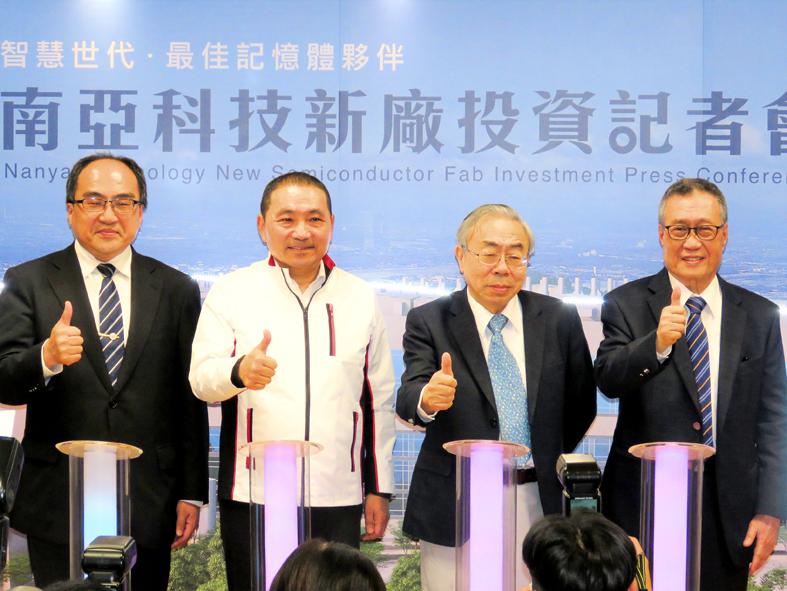DRAM chipmaker Nanya Technology Corp (南亞科技) yesterday said it plans to invest about NT$300 billion (US$10.66 billion) to build a 12-inch fab to produce 10-nanometer chips, as demand for memory chips for 5G, artificial intelligence (AI) and consumer electronics applications soars.
It is the chipmaker’s first major capacity expansion in four years. Nanya Technology last invested about NT$200 billion for its process technology migration from 30 nanometers to 20 nanometers and 10 nanometers.
“We have little room [for further expansion] at existing factories. Nanya Technology needs to continue investing on developing new process technologies and new products, and expand capacity to ensure sustainable growth,” Nanya Technology president Lee Pei-ing (李培瑛) told reporters on the sidelines of a news conference in New Taipei City.

Photo: Chen Hsin-yu, Taipei Times
On the demand side, the DRAM market is expected to grow at an annual pace of 15 to 25 percent, fueled by a variety of applications from 5G, AI, automotive, industrial and Internet of Things devices, Lee said.
The world’s major DRAM suppliers are expanding capacity to match an anticipated growth in demand, he added.
Nanya Technology expects its output for this year to be flat or to increase slightly from last year, after an annual expansion of 35 percent last year.
The new 12-inch fab, to be built in New Taipei City’s Taishan District (泰山), would add 45,000 12-inch wafers to the firm’s monthly capacity of 70,000 equivalent-
wafers, helping it to capture new growth opportunities, Lee said.
The chipmaker expects the fab to start commercial shipments in 2024, with a monthly capacity of 15,000 wafers in the first phase.
With the introduction of more advanced technologies, the new fab would help Nanya Technology broaden its product portfolio and expand its customer base from about 800, Lee said.
The company plans to deploy 10-nanometer process technology, developed entirely by the chipmaker, he said.
Nanya Technology had joined forces with major DRAM chipmakers, including Micron Technology Inc, to develop new-generation process technologies.
The company aims to lift its server DRAM share to about 10 percent of its total revenue, from 5 percent, Lee said.
The chipmaker generates up to 70 percent of its revenue from supplying DRAM used in consumer electronics, such as set-top boxes and game consoles.
Nanya Technology said it has no fundraising plans for the near term, as it had accumulated NT$686.7 billion as of the end of last quarter.
The firm’s capacity expansion plan comes amid DRAM supply constraints. Market researcher TrendForce Corp (集邦科技) yesterday raised its DRAM price forecast for the current quarter due to strong demand for PCs and servers amid the COVID-19 pandemic.
The average selling price of DRAM is expected to rise 18 to 23 percent, up from a range of 13 to 18 percent estimated previously, TrendForce said.

CHAOS: Iranians took to the streets playing celebratory music after reports of Khamenei’s death on Saturday, while mourners also gathered in Tehran yesterday Iranian Supreme Leader Ayatollah Ali Khamenei was killed in a major attack on Iran launched by Israel and the US, throwing the future of the Islamic republic into doubt and raising the risk of regional instability. Iranian state television and the state-run IRNA news agency announced the 86-year-old’s death early yesterday. US President Donald Trump said it gave Iranians their “greatest chance” to “take back” their country. The announcements came after a joint US and Israeli aerial bombardment that targeted Iranian military and governmental sites. Trump said the “heavy and pinpoint bombing” would continue through the week or as long

TRUST: The KMT said it respected the US’ timing and considerations, and hoped it would continue to honor its commitments to helping Taiwan bolster its defenses and deterrence US President Donald Trump is delaying a multibillion-dollar arms sale to Taiwan to ensure his visit to Beijing is successful, a New York Times report said. The weapons sales package has stalled in the US Department of State, the report said, citing US officials it did not identify. The White House has told agencies not to push forward ahead of Trump’s meeting with Chinese President Xi Jinping (習近平), it said. The two last month held a phone call to discuss trade and geopolitical flashpoints ahead of the summit. Xi raised the Taiwan issue and urged the US to handle arms sales to

State-run CPC Corp, Taiwan (CPC, 台灣中油) yesterday said that it had confirmed on Saturday night with its liquefied natural gas (LNG) and crude oil suppliers that shipments are proceeding as scheduled and that domestic supplies remain unaffected. The CPC yesterday announced the gasoline and diesel prices will rise by NT$0.2 and NT$0.4 per liter, respectively, starting Monday, citing Middle East tensions and blizzards in the eastern United States. CPC also iterated it has been reducing the proportion of crude oil imports from the Middle East and diversifying its supply sources in the past few years in response to geopolitical risks, expanding

Pro-democracy media tycoon Jimmy Lai’s (黎智英) fraud conviction and prison sentence were yesterday overturned by a Hong Kong court, in a surprise legal decision that comes soon after Lai was jailed for 20 years on a separate national security charge. Judges Jeremy Poon (潘兆初), Anthea Pang (彭寶琴) and Derek Pang (彭偉昌) said in the judgement that they allowed the appeal from Lai, and another defendant in the case, to proceed, as a lower court judge had “erred.” “The Court of Appeal gave them leave to appeal against their conviction, allowed their appeals, quashed the convictions and set aside the sentences,” the judges